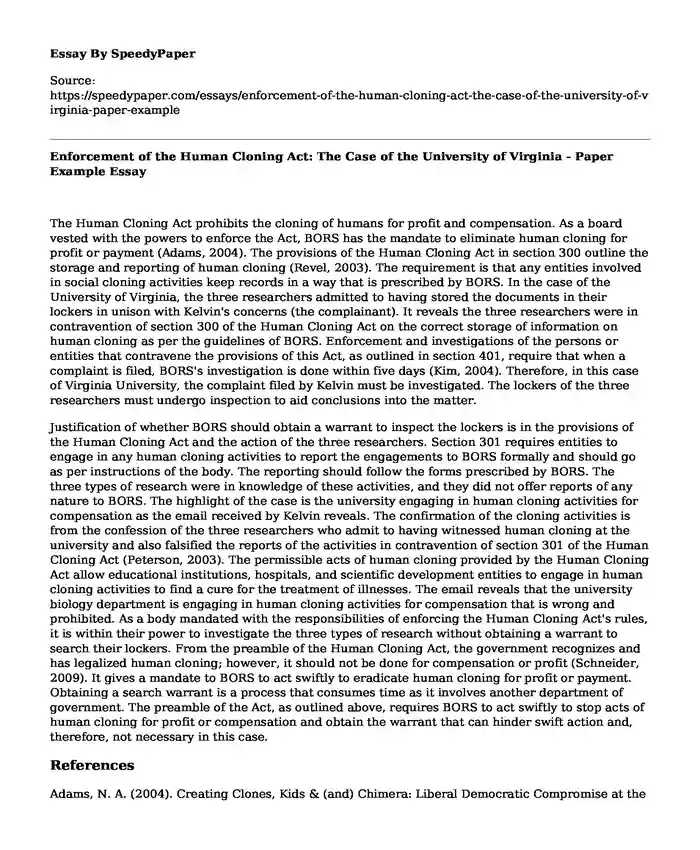
| Type of paper: | Essay |
| Categories: | University Government |
| Pages: | 3 |
| Wordcount: | 679 words |
The Human Cloning Act prohibits the cloning of humans for profit and compensation. As a board vested with the powers to enforce the Act, BORS has the mandate to eliminate human cloning for profit or payment (Adams, 2004). The provisions of the Human Cloning Act in section 300 outline the storage and reporting of human cloning (Revel, 2003). The requirement is that any entities involved in social cloning activities keep records in a way that is prescribed by BORS. In the case of the University of Virginia, the three researchers admitted to having stored the documents in their lockers in unison with Kelvin's concerns (the complainant). It reveals the three researchers were in contravention of section 300 of the Human Cloning Act on the correct storage of information on human cloning as per the guidelines of BORS. Enforcement and investigations of the persons or entities that contravene the provisions of this Act, as outlined in section 401, require that when a complaint is filed, BORS's investigation is done within five days (Kim, 2004). Therefore, in this case of Virginia University, the complaint filed by Kelvin must be investigated. The lockers of the three researchers must undergo inspection to aid conclusions into the matter.
Justification of whether BORS should obtain a warrant to inspect the lockers is in the provisions of the Human Cloning Act and the action of the three researchers. Section 301 requires entities to engage in any human cloning activities to report the engagements to BORS formally and should go as per instructions of the body. The reporting should follow the forms prescribed by BORS. The three types of research were in knowledge of these activities, and they did not offer reports of any nature to BORS. The highlight of the case is the university engaging in human cloning activities for compensation as the email received by Kelvin reveals. The confirmation of the cloning activities is from the confession of the three researchers who admit to having witnessed human cloning at the university and also falsified the reports of the activities in contravention of section 301 of the Human Cloning Act (Peterson, 2003). The permissible acts of human cloning provided by the Human Cloning Act allow educational institutions, hospitals, and scientific development entities to engage in human cloning activities to find a cure for the treatment of illnesses. The email reveals that the university biology department is engaging in human cloning activities for compensation that is wrong and prohibited. As a body mandated with the responsibilities of enforcing the Human Cloning Act's rules, it is within their power to investigate the three types of research without obtaining a warrant to search their lockers. From the preamble of the Human Cloning Act, the government recognizes and has legalized human cloning; however, it should not be done for compensation or profit (Schneider, 2009). It gives a mandate to BORS to act swiftly to eradicate human cloning for profit or payment. Obtaining a search warrant is a process that consumes time as it involves another department of government. The preamble of the Act, as outlined above, requires BORS to act swiftly to stop acts of human cloning for profit or compensation and obtain the warrant that can hinder swift action and, therefore, not necessary in this case.
References
Adams, N. A. (2004). Creating Clones, Kids & (and) Chimera: Liberal Democratic Compromise at the Crossroads. Issues L. & Med., 20, 3.
Kim, M. (2004). An Overview of the Regulation and Patentability of Human Cloning and Embryonic Stem Cell Research in the United States and Anti-Cloning Legislation in South Korea. Santa Clara Computer & High Tech. LJ, 21, 645.
Peterson, S. E. (2003). A Comprehensive National Policy to Stop Human Cloning: An Analysis of the Human Cloning Prohibition Act of 2001 with Recommendations for Federal and State Legislatures. Notre Dame JL Ethics & Pub. Pol'y, 17, 217.
Revel, M. (2003). Human reproductive cloning, embryonic stem cells, and germline gene intervention: an Israeli perspective. Med. & L., 22, 701.
Schneider, I. (2009). Indirect commodification of ova donation for assisted reproduction and for human cloning research: Proposals for supranational regulation. Altruism reconsidered: Exploring new approaches to property in human tissue, 209-241.
Cite this page
Enforcement of the Human Cloning Act: The Case of the University of Virginia - Paper Example. (2023, Nov 04). Retrieved from https://speedypaper.net/essays/enforcement-of-the-human-cloning-act-the-case-of-the-university-of-virginia-paper-example
Request Removal
If you are the original author of this essay and no longer wish to have it published on the SpeedyPaper website, please click below to request its removal:
- Application Essay Sample: Seeking for a Chance in Pine Manor College
- Essay Sample Focusing on Cryptocurrency Taxation in Australia
- Essay Example Dedicated to Federal Register and Foundation Center
- Essay Sample on Frameworks and Models for School Nursing Practice
- Sugar in School Breakfasts - Free Paper Sample
- Corporate Governance: Foundational Issues - Paper Example
- Fostering Belonging: The Impact of Inclusion on Students with Disabilities - Essay Sample
Popular categories




